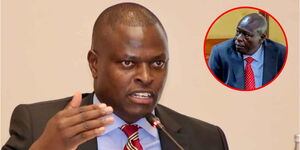Businessman Jimi Wanjigi on Sunday, June 11, outlined three options that President William Ruto could explore in addressing the national debt crisis Kenya faces
Addressing the press in Nairobi, Wanjigi claimed that Kenya's debt was getting worse by the day and that President Ruto should consider unpopular methods of dealing with the looming crisis.
In the three options, Wanjigi explained that all of them carried some degree of pain to the nation and particularly, the government.
"The President should, first of all, consider debt rescheduling. This would involve negotiating with creditors to extend the repayment period for existing debts," Wanjigi suggested.
Debt Rescheduling
The businessman also stated that debt rescheduling would reduce the amount of debt that Kenya has to pay each year but it would also increase the total amount of interest his government would be expected to settle.
Debt rescheduling is the process of restructuring the terms of a loan agreement between a borrower and a lender. This can involve extending the repayment period, reducing the interest rate, or both.
Debt rescheduling is often used when a borrower is unable to make their regular payments due to financial difficulties. There are a number of reasons why a country might need to reschedule its debt, including the potential state of economic recession.
A recession can lead to a decline in revenue, which can make it difficult for businesses and governments to repay their debts.
Debt Defaulting
Wanjigi also postulated that the Kenya Kwanza regime should consider defaulting on the debt that the country should be paid to lenders, similar to what Ghana is going through.
"Debt defaulting would mean that Kenya would stop making payments on its debt. This would have a negative impact on Kenya's credit rating and could make it more difficult for Kenya to borrow money in the future," Wanjigi stated.
Debt default is a situation where a borrower is unable or unwilling to make a loan payment when it is due. When a borrower defaults on a loan, the lender may take legal action to collect the debt. This could include garnishing wages, seizing assets, or even filing for bankruptcy.
There are two main types of debt default, those are technical and willful. Technical default occurs when a borrower misses a payment but has the intention of making it up later. Willful default occurs when a borrower has no intention of making the payment and is simply refusing to pay.
When a borrower defaults on a loan, it can have a number of negative consequences. The borrower's credit score will likely take a hit, making it more difficult to obtain future loans. The borrower may also be subject to late fees and penalties. In some cases, the borrower may even be sued by the lender.
Odious Debt Declaration
The third option, according to Wanjigi, is the odious debt declaration, which would force President Ruto to declare some of Kenya's debt is illegal meaning that it was incurred for illegitimate purposes.
"If Kenya was to successfully declare some of its debt as odious, it would not be legally required to repay it," businessman Wanjigi advised.
He observed that the best option for Kenya will depend on a number of factors, including the amount of debt that Kenya has, the interest rates on that debt, and Kenya's credit rating.
Wanjigi noted that there are no easy or painless solutions to Kenya's debt problem and that either way, President Ruto will have to choose the least painful method.
As of March 2023, Kenya's public debt stock stood at Ksh9.40 trillion, equivalent to 62 per cent of the country's Gross Domestic Product (GDP). This represents a significant increase from the 2022 level of Kshs8.8 trillion, and is the highest level of public debt in Kenya's history.
The rise in public debt is due to a number of factors, including the cost of infrastructure projects, such as the Standard Gauge Railway and the Lamu Port-South Sudan-Ethiopia Transport Corridor.
Over the years, Retired President Uhuru Kenyatta's government borrowed to finance its budget deficit and cushion Kenyans from the impact of the COVID-19 pandemic, which led to a decline in tax revenue and an increase in government spending.
Experts had previously warned that a high level of public debt is a cause for concern, as it could lead to a number of problems, such as higher interest payments, which could crowd out spending on other priorities.












